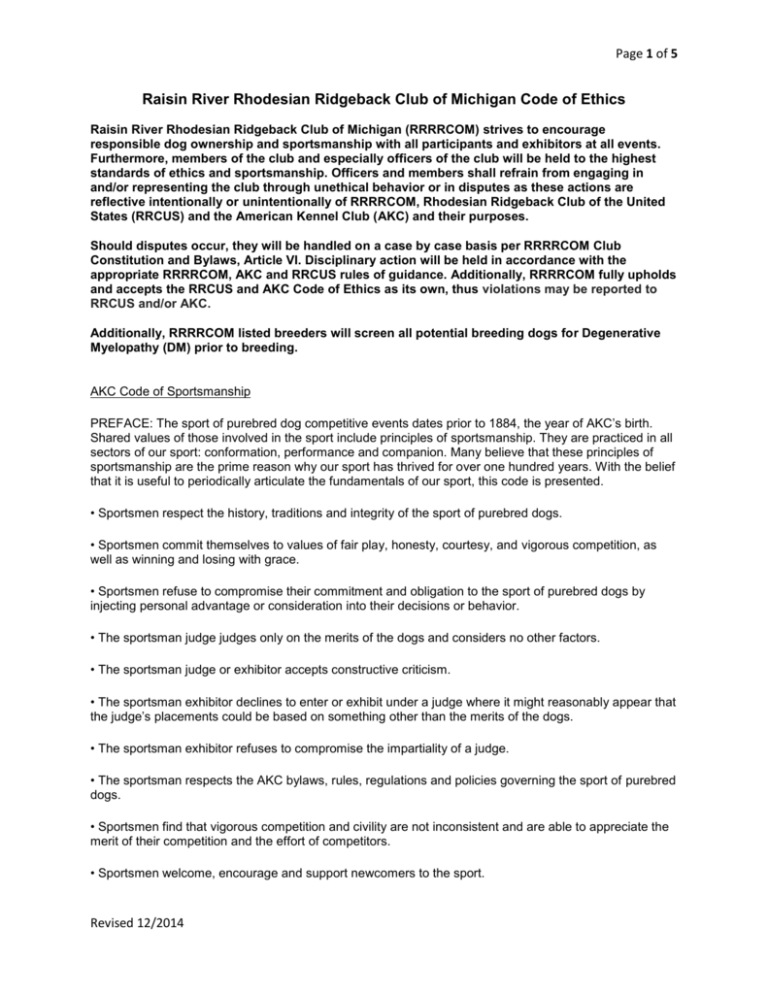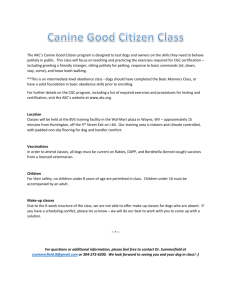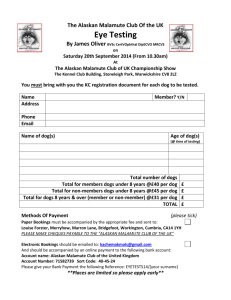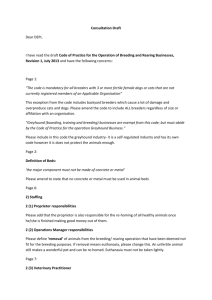Code of Ethics - Raisin River Rhodesian Ridgeback Club of Michigan
advertisement

Page 1 of 5 Raisin River Rhodesian Ridgeback Club of Michigan Code of Ethics Raisin River Rhodesian Ridgeback Club of Michigan (RRRRCOM) strives to encourage responsible dog ownership and sportsmanship with all participants and exhibitors at all events. Furthermore, members of the club and especially officers of the club will be held to the highest standards of ethics and sportsmanship. Officers and members shall refrain from engaging in and/or representing the club through unethical behavior or in disputes as these actions are reflective intentionally or unintentionally of RRRRCOM, Rhodesian Ridgeback Club of the United States (RRCUS) and the American Kennel Club (AKC) and their purposes. Should disputes occur, they will be handled on a case by case basis per RRRRCOM Club Constitution and Bylaws, Article VI. Disciplinary action will be held in accordance with the appropriate RRRRCOM, AKC and RRCUS rules of guidance. Additionally, RRRRCOM fully upholds and accepts the RRCUS and AKC Code of Ethics as its own, thus violations may be reported to RRCUS and/or AKC. Additionally, RRRRCOM listed breeders will screen all potential breeding dogs for Degenerative Myelopathy (DM) prior to breeding. AKC Code of Sportsmanship PREFACE: The sport of purebred dog competitive events dates prior to 1884, the year of AKC’s birth. Shared values of those involved in the sport include principles of sportsmanship. They are practiced in all sectors of our sport: conformation, performance and companion. Many believe that these principles of sportsmanship are the prime reason why our sport has thrived for over one hundred years. With the belief that it is useful to periodically articulate the fundamentals of our sport, this code is presented. • Sportsmen respect the history, traditions and integrity of the sport of purebred dogs. • Sportsmen commit themselves to values of fair play, honesty, courtesy, and vigorous competition, as well as winning and losing with grace. • Sportsmen refuse to compromise their commitment and obligation to the sport of purebred dogs by injecting personal advantage or consideration into their decisions or behavior. • The sportsman judge judges only on the merits of the dogs and considers no other factors. • The sportsman judge or exhibitor accepts constructive criticism. • The sportsman exhibitor declines to enter or exhibit under a judge where it might reasonably appear that the judge’s placements could be based on something other than the merits of the dogs. • The sportsman exhibitor refuses to compromise the impartiality of a judge. • The sportsman respects the AKC bylaws, rules, regulations and policies governing the sport of purebred dogs. • Sportsmen find that vigorous competition and civility are not inconsistent and are able to appreciate the merit of their competition and the effort of competitors. • Sportsmen welcome, encourage and support newcomers to the sport. Revised 12/2014 Page 2 of 5 • Sportsmen will deal fairly with all those who trade with them. • Sportsmen are willing to share honest and open appraisals of both the strengths and weaknesses of their breeding stock. • Sportsmen spurn any opportunity to take personal advantage of positions offered or bestowed upon them. • Sportsmen always consider as paramount the welfare of their dog. • Sportsmen refuse to embarrass the sport, the American Kennel Club, or themselves while taking part in the sport. RRCUS Code of Ethics This Code of Ethics is presented as Standards of Conduct for members of the Rhodesian Ridgeback Club of the United States of America, Inc. (RRCUS) whose foremost aims should be the welfare and improvement of the Breed. The purpose of the Code of Ethics is to set forth standards to which the (RRCUS) would have its members adhere, in order to further the goals and purposes set forth in the constitution and bylaws of the RRCUS. This Code of Ethics is established to aid them in that pursuit. These Standards of Conduct are presented with the realization that ethics are difficult to regulate and that most individuals desire and intend to do what is right. I. HEALTH 1. All dogs shall be kept in a clean, healthy, and safe environment. 2. Dogs will be provided with all nutrition, exercise, socialization, vaccinations, deworming, and external parasite control and appropriate veterinary treatment necessary to provide maximum mental and physical well-being. 3. When a Rhodesian Ridgeback (neonate through adult) must be euthanized, the procedure should be humanely performed. II. BREEDING: A breeder's aim and foremost responsibility shall be to produce the healthiest and best representatives of the breed possible. 1. Each litter shall be the result of conscientious planning, including consideration of physical and genetic health, soundness, temperament and conformity to the official standard of the breed as established by the RRCUS and approved by the American Kennel Club (AKC). a. In order to protect the health and safety of the stud dog and brood bitch (as well as resulting puppies) it is recommended that both dog and bitch have pre-breeding veterinary screenings to certify that they are in good breeding condition. Tests may include, but are not limited to: brucella test, urinalysis (dog), vaginal exam, and vaginal culture. Revised 12/2014 Page 3 of 5 b. Only dogs screened and certified clear of hip and elbow dysplasia by the Orthopedic Foundation for Animals (OFA), Pennhip or comparable foreign registry shall be bred. c. RRCUS has identified other strongly recommended screenings that are outlined in the Canine Information Center (CHIC), such as a complete thyroid panel from an OFA approved laboratory or ACVIM Board certified Internal Medical specialist, cardiac certification (OFA or cardiologist evaluation), CERF* and BAER testing, RRCUS strongly recommends the testing be performed on all breeding stock, recognizing that a CHIC certification does not require a passing grade. If there is a reason to believe that screening results are not accurate, repeat evaluations are recommended. Breeders shall endeavor to stay current in their knowledge of all known heritable diseases present in the breed and demonstrate reasonable care in eliminating those diseases. Full disclosure of all health screening results shall been made available to all involved in a potential breeding, prior to that breeding taking place. (*indicates annual re-test requirement) d. Only mature adult dogs shall be used in a breeding program. Additional precautions, including a veterinarian consultation, should be taken when breeding a bitch over seven (7) years and under 18 months of age. Dogs and bitches under 24 months of age may only be bred if preliminary genetic clearances have been obtained (see “B” and “C above) e. Dogs born after 2000 whose semen has been collected and frozen must meet the standards published in this current Code of Ethics. Dogs born prior to 2000 whose semen has been collected and frozen shall only be required to be certified free of hip dysplasia by OFA or a comparable foreign registry. 2. Only purebred, American Kennel Club (AKC) [or equivalent] registered Rhodesian Ridgebacks shallbe used for breeding. 3. A litter should only be bred with the intention of producing conformation and performance candidates and not for the pet market alone. 4. When entering into a breeding agreement a written contract shall be signed and dated by all owners and co-owners of the sire and dam. Full disclosure of all test results for inheritable disease shall be made available to all parties. 5. Breeders are responsible for the progeny of their dogs. They are required to assist in the placement and care of any dog in rescue that was bred by them. For the purposes of this document “Breeder” is defined as the owner, co-owner or lessee of the broodbitch at the time of breeding, whelping, selling and/or placing of the puppies. Stud dog owners should be responsible for the progeny of their dogs, and are encouraged to assist in the placement and care of any dog in rescue that was sired by their dog. For the purposes of this document “Stud dog owner” is defined as the owner, co-owner or lessee of the stud dog at the time of the breeding.” III. SALES: Members must be particularly concerned with the proper placement of adults as well as puppies, both pet and show potential. 1. Rhodesian Ridgebacks should not be displayed in public places or on the internet for the sole purpose of immediate sale. Revised 12/2014 Page 4 of 5 2. Breeders shall require purchasers to spay or neuter any dog that is not considered breedable quality and make use of limited registrations where appropriate. When puppies with serious defects or faults (Dermoid Sinus, ridgelessness) are sold rather than culled, the breeder must take the extra responsibility to see that the dog is spayed or neutered. Dermoid surgery should be performed prior to placing the pup in a new home. 3. Members will not knowingly furnish puppies or adult dogs for wholesale, pet shops, puppy brokers, commercial facilities, guard dog businesses or agents thereof, or dispose of them as “Give away” prizes or auction items; neither will they sell puppies to nor breed to dogs owned by those whom they have reason to believe may do so. 4. Members will not dispose of dogs or puppies by giving them to the local animal shelter, pound, humane society or any organization of that type. 5. AKC (or equivalent) Registration papers or a bill of sale stating sire, dam, and date of birth shall accompany puppies as they go to new homes. 6. Breeders shall furnish the buyer with written details on feeding, dates of inoculations, deworming, and general care of the dog and the name and address of a licensed veterinarian who has examined the puppy after the age of six weeks. Furthermore, full written disclosure of inheritable disease testing done on both sire and dam shall be enclosed in the puppy packet when the puppy leaves the breeder’s home. 7. Responsibility of the breeder does not stop with the sale. The breeder should be available for consultation and to assist in the recovery and placement of any dog sold by the breeder if such need arises at any time in the dogs’ life. IV. REGISTRATION AND RECORDS 1. All members shall keep complete and accurate records of individual dogs, breedings, litters, pedigrees, and puppy sales as required by the AKC, and abide by the AKC rules and regulations. 2. Whenever a dog changes in ownership all parties shall enter into a signed and dated written agreement. V. CONDUCT: Members shall do all within their power to uphold, promote and protect the interests of the breed by conducting themselves in a manner reflecting credit on the Club, its members, their dogs, and the dog world in general. 1. Members shall abide by the rules and regulations of the AKC (or the rules under which an event is held), and exhibit in the spirit of good sportsmanship, treating all present with respect and courtesy. 2. Hotels and show grounds shall be treated with respect and left in a clean condition. 3. Consideration of other guests in the hotel is imperative, dogs creating a disturbance are to be attended to immediately, and precautions taken to see that it does not happen again. 4. A member does not engage in false or misleading statements regarding a judge, official, exhibitor, fellow member, another dog, or misrepresentation of their own dogs through claims or advertising. Revised 12/2014 Page 5 of 5 5. Documented misconduct or violation of this Code of Ethics should objectively and calmly be presented to the proper representative of RRCUS or the AKC when appropriate. 6. It is the intent of open registry and exchange of information to encourage breeders to make knowledge breeding decisions, therefore RRCUS Members shall not use information from open registries and/or full disclosure of health screen results maliciously or to malign. Education and communication are the preferred methods of obtaining compliance to this Code of Ethics; however, flagrant, serious and/or repeated disregard of this code may result in formal charges brought before the RRCUS Board of Directors by RRCUS members, nonmembers and/or the Ethics Committee. Contract violations as well as slanderous or libelous allegations between members shall be adjudicated in the courts prior to presentation to the proper representatives of the RRCUS. Revised 12/2014


